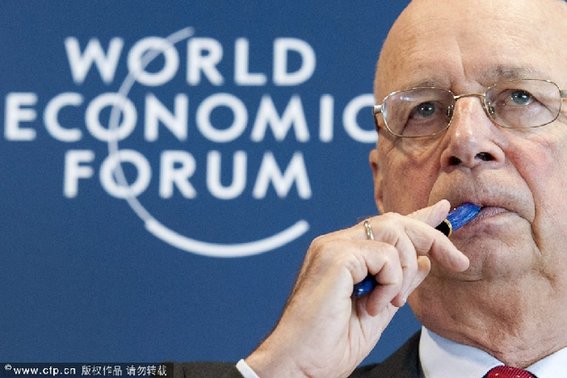Davos wakes up again to global brainstorming
 0 Comment(s)
0 Comment(s) Print
Print E-mail
Xinhua, January 25, 2012
E-mail
Xinhua, January 25, 2012
 |
|
German Klaus Schwab, founder and president of the World Economic Forum, WEF, gestures during a press conference, in Cologny near Geneva, Switzerland, Jan. 18, 2012. [CFP] |
Almost like migration, each year at the beginning of the year, political leaders, business tycoons and academia gather at a tranquil Swiss Alpine town, Davos, for the biggest entrepreneurial brainstorming event of the year.
On Tuesday, with the first waves of delegates arriving, Davos wakes up again from its hibernation.
This year, from Jan. 25 to 29, some 2,600 delegates from over 100 countries are expected to join the 5-day gathering that draws attention from almost all mainstream media worldwide.
Convening at the beginning of each year, for over 40 years, the event has been taken by some as a weathervane of global economic trends. Where the wind blows this year? The world will wait and see.
Whom to expect?
As usual, entrepreneurs comprise a majority of the participants, and 2012 makes no exception. This year will see more than 1,600 business leaders, of whom 1,000 are top executives. The collection is more than sufficient to ensure Davos as a top-notch club for business leaders.
However, this is less the case with political leaders. Despite 40 heads of state or government and over 85 ministers registered for the meeting, unlike last few years, some key figures from major countries will be absent from this year's event.
Apart from Germany that sends its Chancellor Angela Merkel to deliver the opening speech, and Britain with the presence of its Prime Minister David Cameron, other major countries such as Russia and the United States are represented at vice prime minister or ministerial-level.
International organizations will be well-represented at the gathering, with nearly 40 top international organizations bringing well-known names such as Secretary-General of the United Nations Ban Ki-moon, Managing Director of the International Monetary Fund Christine Largarde, President of the World Bank Group Robert Zollick and Director-General of the World Trade Organization Pascal Lamy.
In addition, more than 200 leaders from academia, over 120 Global Young Leaders and more than 100 civil society organizations will participate.
Wat to focus on
Does capitalism fit the world today? It was a question posed by Founder and Executive Chairman of the World Economic Forum, Klaus Schwab, at an introductory press conference held before the 2012 Annual Meeting.
For Schwab, in the context of failing to learn lessons from the crisis of 2009, capitalism, in its current form, no longer fits the world around us.
Schwab told media the current system of capitalism had failed to address the problems and risks facing the world today, and subsequently, could lead the world to "dystopia," characterized by downward global economy, social disruption, protectionism, nationalism and populism.
"We must recognize that solving problems in the context of outdated and crumbling models will only dig us deeper into the hole," Schwab said, calling for a reform of the old model to keep up with the transformation the world has been undergoing.
"The old model was Capitalism, the new model is Talentism," he said, noting that the new model will center on human talent to encourage creativity, entrepreneurship and innovation driven economic development and social progress.
In this regard, the theme this year's Annual Meeting was set to be "The Great Transformation: Shaping New Models."
Under this theme, there will be 250 sessions of discussions, carried out under four, dual imperative sub-themes reflected throughout the official programme: growth and employment models, leadership and innovation models, Sustainability and resource models, as well as Social and technological models.
What to worry about?
At Davos, apart from scarce accommodation and snows that threaten to defer transportation from time to time, delegations obviously have more to worry about.
With some EU countries deeply in debt and demands from almost all developed countries dwindling, and social upheavals as a result of the economic underperformance, the world is facing increasing risks on a scale unseen for decades.
This was reflected in the World Economic Forum's flagship publication, Global Risks 2012, issued on Jan. 11, which warns the world is increasingly vulnerable to further economic shocks and social upheaval risks.
The report, which focuses on the findings of a survey of 469 experts and industry leaders, outlined top five global risks in terms of likelihood in the next 10 years: severe income disparity, chronic fiscal imbalances, rising greenhouse gas emission, cyber attacks and water supply crisis.
Chronic fiscal imbalances and severe income disparity are the risks seen by the report as most prevalent over the next decade.
The report believes these risks in tandem threaten global growth as they are drivers of nationalism, populism and protectionism at a time when the world remains vulnerable to systemic financial shocks, as well as possible food and water crises.
"This new malaise is particularly acute in the industrialized countries that historically have been a source of great confidence and bold ideas," said Lee Howell, the World Economic Forum Managing Director responsible for the report.






Go to Forum >>0 Comment(s)